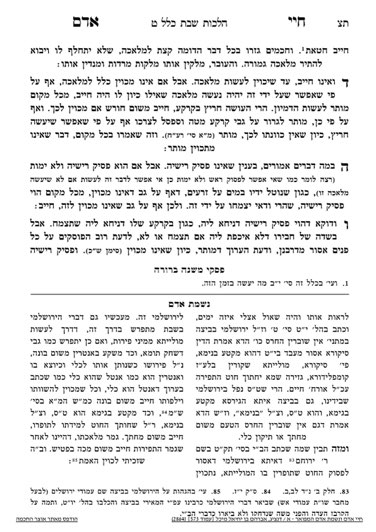We are beginning siman 5. The Gemara gives a caveat to the heter of davar she’eino miskavein, and says that even Rav Shimon agrees that a case of psik reisha is assur. Psik reisha literally means to cut off the head, and is used by the Gemara to mean something inevitable. Thus, the Chayei Adam writes that the discussion of the previous siman, where we learned that davar she’eino miskavein is muttar, is only when the unintended action is not a psik reisha. In other words, we learned that when a person does x action, if y action will possibly occur as a result, it is muttar to perform x action (provided one does not have intention for y). However, if it is inevitable that y action will occur–similar to the inevitable death of an animal or person, chas veshalom, by cutting off its head–Rav Shimon agrees that it is assur to perform x action.
The Chayei Adam gives the example of a person wishing to wash netilas yadayim on ground. On the one hand, one can understand it as a davar she’eino miskavein, since the person had no intention to water the plants. On the other hand, it is inevitable that water spilled over ground will assist in the growth of the plant, and is a toldah of zoreiah and a melacha deoraysa. Thus, when the question is a situation of psik reisha, the heter of davar she’eino miskavein does not apply. Not only is it assur, it is chayav on a deoraysa level.
There are certain issurim which are chayav on a deoraysa level. There are other issurim which are patur mideoraysa, but still assur, some being assur mideoraysa and some being assur miderabanan. Thus, although davar she’eino miskavein brings the issur from assur deoraysa to muttar, psik reisha makes it chayav again on a deoraysa level.
According to Rav Shimon, if the heter of davar she’eino miskavein is due to the lack of intent (see previous shiur), why would psik reisha become assur? The achronim present two possibilities. One is that if b is an inevitable consequence of a, such that b=a and a=b, if a person has kavanah for a, the kavanah for a transfers to b. Another possibility is that since psik reisha is inevitable, it means the person performing the action is aware of this outcome, and they are agreeing to accept that consequence. Thus, it is considered as having kavanah for both outcomes.
Summary
- Davar she’eino miskavein is the general Torah concept of performing one action with an unintended aveirah which may occur in addition. We pasken in accordance with Rav Shimon, that it is muttar
- Davar she’eino miskavein does not only apply to Shabbos but to all issurim.
- However, if it is inevitable that the unintended aveirah will occur, it is called a psik reisha that the unintended action will occur, and one becomes chayav mideoraysa for causing that unintended assur action to occur.



